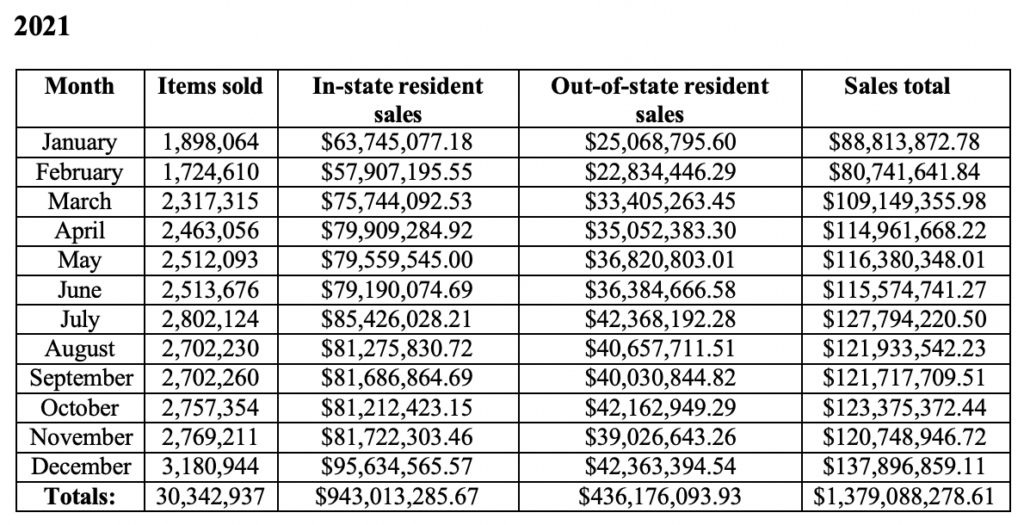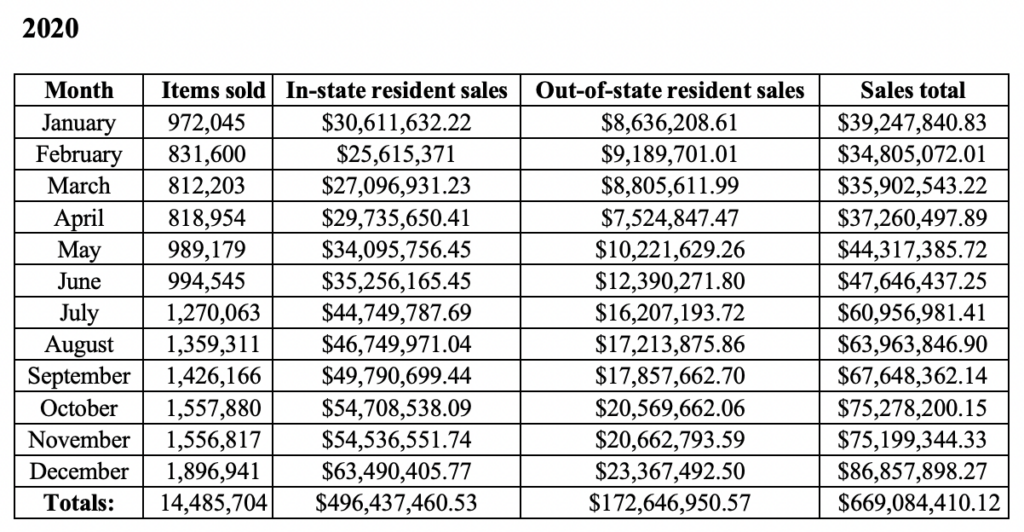Business
Illinois Adult-Use Marijuana Sales Top $3 Billion Since Market Launched, With $1 Billion Sold So Far This Year Alone

Illinois has already crossed the $1 billion mark for recreational marijuana sales in 2022—two months earlier than when the state reached that threshold last year—state data shows. And it’s officially crossed $3 billion in adult-use cannabis purchases since shops first opened in 2020.
While the August cannabis sales total of $129,441,315 is about $6 million below the 2022 monthly record set in July, Illinois’s total for the year now stands at $1,015,700,115.

Via IDFPR.
Last year, it took until October for the state to exceed $1 billion.

Via IDFPR.
The previous year, which was when adult-use retailers opened, consumers purchased $669,084,410 worth of marijuana.

Via IDFPR.
Taken together, Illinois has seen $3,063,872,803 in marijuana sales since the recreational market launched, according to data from the Illinois Department of Financial and Professional Regulation (IDFPR).
In contrast, it took Massachusetts more than three years to reach $3 billion in recreational marijuana sales as of May.
For August, IDFPR shows that there were $88,309,118 in sales from Illinois residents, in addition to $41,132,196 from out-of-state visitors. A total of 3,063,423 cannabis items were sold in the state last month.
Medical cannabis sales figures are reported separately by a different state agency, and aren’t accounted for in the new recreational data.
Gov. J.B. Pritzker (D) recently touted the state’s marijuana sales and resulting tax revenue for the 2022 Fiscal Year. Illinois collected $445.3 million in tax dollars from $1.5 billion in cannabis sales during that period. That’s a 50 percent increase is cannabis tax dollars compared to the prior fiscal year.
Local governments received $146.2 in cannabis tax disbursements in the latest fiscal year, up 77 percent from the prior year.
While 2022 recreational marijuana sales have been generally stable this year, there’s an expectation that purchases could increase demonstrably since officials recently approved additional social equity marijuana retailer licenses in July, which will be a significant expansion in the number of dispensaries once those businesses become operational.
The governor and other state officials have emphasized that they’re committed to ensuring that portions of tax revenue from the marijuana market go toward community reinvestment, as prescribed under the state’s legalization law.
In June, Illinois officials announced that the state is awarding $45 million in grants funded by marijuana tax dollars to support community reinvestment in areas “hardest hit by the failed war on drugs.”
That marks the second round of funding that’s being made available through the state’s Restore, Reinvest, and Renew (R3) program, which was established under Illinois’s adult-use cannabis legalization law.
Last year, state officials also put $3.5 million in cannabis-generated funds toward efforts to reduce violence through street intervention programs.
From last year’s sales, Illinois generated almost $100 million more in tax revenue from adult-use marijuana sales than from alcohol in 2021, state data found.
While state officials have consistently voiced their commitment to equity, legalization’s rollout hasn’t been without hiccups and frustration among would-be licensees. Illinois regulators have faced legal challenges over the way social equity licensing applications have been managed, with complaints about the lottery system that the state later said it would work to resolve.
A court order prohibited the state from approving additional recreational cannabis shops for nearly a year before that decision was lifted in May. With the ban removed, officials announced in late July that they accepted new marijuana retailer licenses for social equity applicants.
Still, an alliance of cannabis businesses and advocates, led by Chicago NORML, have expressed ongoing frustration over the state’s management of the social equity licensees, and they held a press conference on Wednesday to call attention to the issue.
In addition to providing community reinvestment funding, the governor announced in 2020 that his office had processed more than 500,000 expungements and pardons for people with low-level cannabis convictions on their records.
Pritzker also recently signed a bill that will make it so courts cannot deny petitions to expunge or seal records based on a positive drug test for marijuana.
A state-funded initiative was also recently established to help residents with marijuana convictions get legal aid and other services to have their records expunged.
Meanwhile, California has taken in nearly $4 billion in marijuana tax revenue since the state’s adult-use market launched in 2018, the Department of Tax and Fee Administration (CDTFA) reported in May.
States that legalized marijuana for adult use collectively generated more than $3.7 billion in tax revenue from recreational cannabis sales in 2021 alone, a report from the Marijuana Policy Project (MPP) that was released April found.
D.C. Lawmakers Demand Congress End Local Marijuana Sales Prohibition As Part Of 2023 Spending Bill















